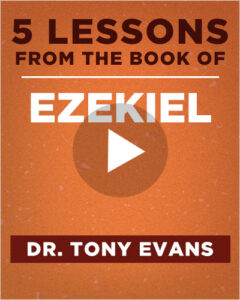You might think of Ezekiel, one of the major Old Testament prophets, as God’s “performance artist.” It wasn’t enough for him to preach to the exiles in Babylon. He was also given the job of enacting a series of odd little parables to help his fellow Israelites see the truth about themselves more clearly and be reminded to look to God for salvation. Ezekiel not only used words: he offered a series of unforgettable word pictures by acting them out before the eyes of God’s people.
Ezekiel spoke of the judgment of God and of a visionary hope for the future.
For example, he ate a scroll—yes, ate it. He lay on one side for 390 days and then on his other side for many more days. For a period of time, he ate only one meal a day—cooked over manure. He smashed pottery and spoke of the fantastical visions that God had given him. To many, Ezekiel might have almost seemed crazy, but his message—whether delivered by words or acted out—was urgent. Ezekiel spoke of the judgment of God and of a visionary hope for the future.
Because of God’s faithfulness to His covenant and His desire to save, He promised that He would not give up on His people. He would cleanse them from their sin and shepherd them with compassion. And He promised a coming victory over all who raised themselves against the people of God. That was the message of hope God didn’t want His people to forget.
That was the message of hope God didn’t want His people to forget.
Here’s a short video that highlights five key themes from the book of Ezekiel. May you be blessed by it.









